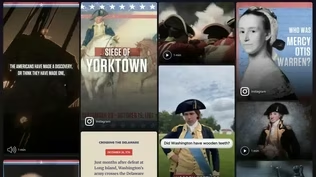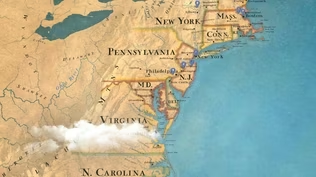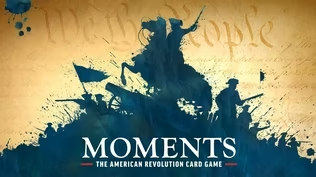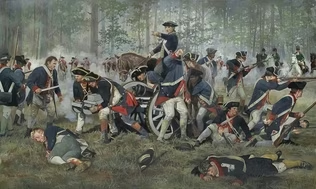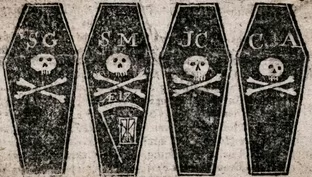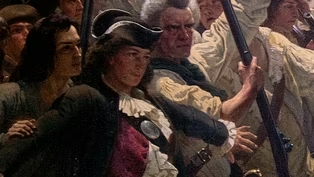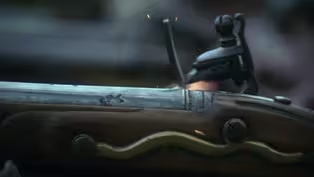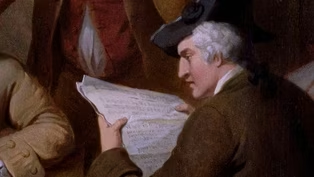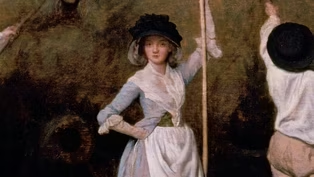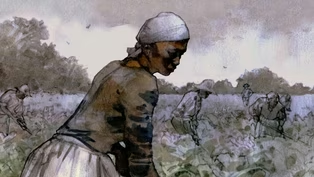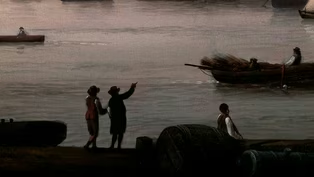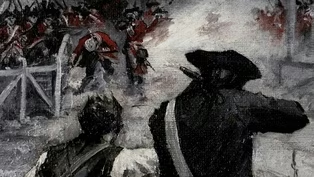
Tea, Tar and Tyranny: How the Boston Tea Party Changed Everything
Clip: Episode 1 | 9m 26sVideo has Closed Captions
Bostonians protest the newly passed Tea Act by dumping 46 tons of tea into the Boston Harbor.
The British impose a new law on the colonies called the Tea Act, which is intended to stop smuggling and support the bankrupt East India Company. The act is deeply unpopular and prompts 50 to 60 Bostonians crudely dressed as Native Americans to dump 46 tons of British tea into the Boston Harbor. The British government responds by cracking down on Massachusetts, hoping to contain the rebellion.
Problems playing video? | Closed Captioning Feedback
Problems playing video? | Closed Captioning Feedback
Episodes presented in 4K UHD on supported devices. Corporate funding for THE AMERICAN REVOLUTION was provided by Bank of America. Major funding was provided by The Better Angels Society and...

Tea, Tar and Tyranny: How the Boston Tea Party Changed Everything
Clip: Episode 1 | 9m 26sVideo has Closed Captions
The British impose a new law on the colonies called the Tea Act, which is intended to stop smuggling and support the bankrupt East India Company. The act is deeply unpopular and prompts 50 to 60 Bostonians crudely dressed as Native Americans to dump 46 tons of British tea into the Boston Harbor. The British government responds by cracking down on Massachusetts, hoping to contain the rebellion.
Problems playing video? | Closed Captioning Feedback
How to Watch The American Revolution
The American Revolution is available to stream on pbs.org and the free PBS App, available on iPhone, Apple TV, Android TV, Android smartphones, Amazon Fire TV, Amazon Fire Tablet, Roku, Samsung Smart TV, and Vizio.
Buy Now
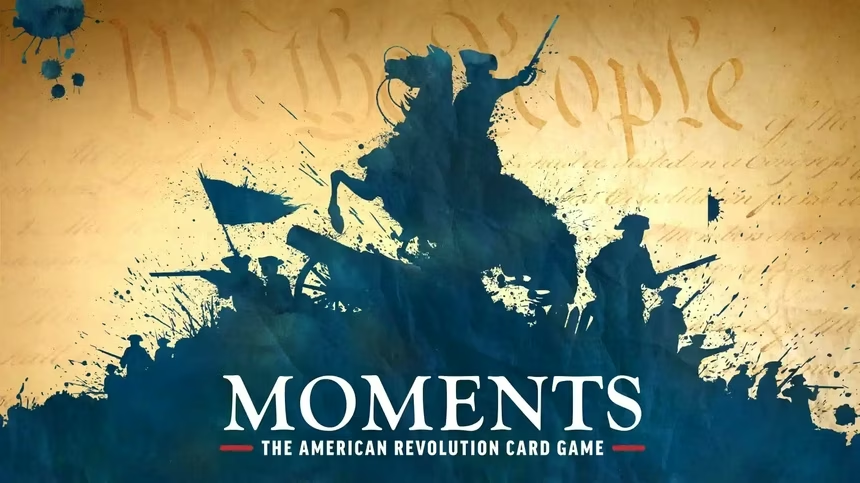
MOMENTS: The Revolutionary War Card Game
Use your knowledge of Revolutionary-era moments to build a timeline of real historical events.Providing Support for PBS.org
Learn Moreabout PBS online sponsorship[Waves crashing] Man: Heave away!
Voice: The Americans have made a discovery, or think they have made one, that we mean to oppress them.
We have made a discovery, or think we have made one, that they intend to rise in rebellion.
Our severity has increased their ill behavior.
We know not how to advance.
They know not how to retreat.
Some party must give way.
Edmund Burke.
Narrator: In October of 1773, 7 ships set out from Plymouth, England for North American ports.
The cargo hold of each was filled with crates of tea.
It all belonged to the Crown- chartered East India Company, which was on the brink of bankruptcy.
To save the company, Lord North, the Prime Minister, had won passage of a new Tea Act, designed to undercut smuggling and reduce the cost of tea.
Kamensky: It seemed to Parliament like a "Win-Win-Win."
Shore up the East India Company, take it more in-house as a governmental organization, and give Americans cheaper, non-smuggled tea at the same time.
Narrator: But colonial merchants who had profited handsomely from smuggling portrayed the new law as yet another assault on American rights.
John Adams wrote that immediate resistance was necessary because of its "attack upon a fundamental principle of the [British] constitution."
No American had consented to the tea tax; therefore, no American need pay it.
Government-appointed tea agents were to be persuaded-- or coerced--into refusing to receive any tea.
In Charleston, South Carolina, the Sons of Liberty "convinced" an agent not to accept the shipment meant for him.
In Philadelphia, the Governor of Pennsylvania talked a ship's captain into sailing back to Britain.
In Boston, when 3 of the ships loaded with tea arrived, thousands of Bostonians and supporters from outlying towns gathered at the Old South Meeting House and declared that the tea should remain on board and be sent back to Britain.
On December 16, 1773, hundreds looked on from shore as between 50 and 60 men-- rich as well as poor-- all crudely disguised as Native Americans, climbed into boats and headed for the ships.
Deloria: They dress like Indians, kinda.
It's an expression of what it is to be American.
When you claim to be Indian, you're claiming to be here, aboriginal, part of this continent.
And you're drawing a really bright line between yourself and the Mother Country.
[Crates smashing; people shouting] Narrator: The men banged open 342 crates and poured more than 46 tons of tea into the harbor.
[Splashing] No other property was disturbed.
And when one of the boarders was seen filling his coat pockets with fistfuls of tea, he received a "severe bruising."
Taylor: This is an assault on the property of the East India Company, and it's an assault upon the pride and the power of Parliament.
So, it's a very big deal.
Protesting taxes is one thing.
Destroying private property worth thousands of pounds sterling, that's something else.
Narrator: In Manhattan, the King had grown so unpopular in some quarters that royal officials thought it prudent to surround his statue with an iron fence.
A law warning of the dire consequences for anyone who dared deface the statue... [Gunshot] did not prevent one New Yorker from firing a musket ball through its cheek... [Gunshot] and another one through its neck.
♪ Voice: The study of the human character opens at once a beautiful and a deformed picture of the soul.
We there find a noble principle implanted in the nature of man.
But when the checks of conscience are thrown aside, or the moral sense weakened, humanity is obscured.
Mercy Otis Warren.
Voice: The most shocking cruelty was exercised a few nights ago upon a poor old man named Malcolm.
There's no law that knows a punishment for the greatest crimes beyond what this is, of cruel torture.
Ann Hulton.
Narrator: In Boston, in January of 1774, a small boy on a sled accidentally ran into a minor customs official named John Malcolm, who cursed and threatened to beat him.
When George Hewes, who had helped dump the tea into Boston harbor, tried to intervene, Malcolm knocked him unconscious with his cane.
[People shouting] Malcolm was hauled from his house.
He was stripped nearly naked, hot tar was poured over him, scalding his flesh, and then he was covered with feathers.
♪ Jasanoff: Tarring and feathering is something that has come down to us as an almost kind of comical thing because you see these people with chicken feathers on them, but this is hideous stuff.
Boiling pitch is poured onto somebody's skin.
The burns are unbelievable.
And it's all part, also, of a kind of spectacle of violence that is a really important part of this.
And this is why the feathers are put on, in part.
It's that you are trying to humiliate and shame the victim.
[Shouting continues] Narrator: Hundreds jeered as Malcolm was pulled through the freezing streets for 5 hours.
His assailants stopped here and there to whip him.
It would be 8 weeks before he was able to leave his bed.
♪ Voice: Boston has been the ringleader of all violence and opposition to the execution of the laws of this country.
Boston has not only therefore to answer for its own violence but for having incited other places to tumults.
Lord North, Prime Minister.
Narrator: Lord North hoped, he said, to make America lie "prostrate at his feet."
They "must fear you," he added, "before they will love you."
Now that they had destroyed Crown property, it was clear that much of America was not afraid.
North would do his best to change that.
In the process, he would try to end every vestige of self-rule prized by the people of Massachusetts.
First, the Prime Minister convinced the Parliament to repeal that colony's long-standing charter, then dissolved the elected assembly again and limited each town and village to just one town meeting a year.
The port of Boston would be closed until all its residents had paid in full for the tea just 60 of them had destroyed.
That came to nearly 5 British pounds per taxpayer-- more than a craftsman made in a month.
It means no ships going in, no ships going out, no work for sailors, no work for merchants.
It means hunger in Boston.
Narrator: British officers were also now empowered to commandeer vacant homes and barns to quarter their troops.
Americans would denounce the new laws as the "Intolerable Acts."
♪ In England on leave, General Gage was summoned by George III.
He told the King what he wanted to hear.
The people of Massachusetts pretended to be "lyons," he said.
But if England sent in enough troops, they would undoubtedly "prove very meek."
General Gage was given a new title-- Governor of Massachusetts in addition to Commander-in-Chief-- and a new mission: to enforce the new Acts, end Boston's resistance, and demonstrate to all the colonies the folly of defying their King and Parliament.
Gage and 4 fresh regiments set sail for Boston in mid-April, 1774.
Video has Closed Captions
Clip: Ep1 | 7m 52s | A bloody clash between Bostonians and the British army leaves five dead in the Boston Massacre. (7m 52s)
Video has Closed Captions
Clip: Ep1 | 9m 39s | The American Revolution will be a war that will pit brother against brother – and birth a nation. (9m 39s)
Video has Closed Captions
Clip: Ep1 | 43s | A single shot echoes on Lexington Green, and the American Revolution begins. (43s)
Video has Closed Captions
Clip: Ep1 | 50s | A spark ignites—quiet, unstoppable. What follows changes everything. (50s)
How Land, Taxes and Rebellion Sparked the American Revolution
Video has Closed Captions
Clip: Ep1 | 7m 28s | The Stamp Act and taxes on American colonists lead to unrest and threaten to cause a revolution. (7m 28s)
How the Townshend Acts Fueled a Resistance Movement
Video has Closed Captions
Clip: Ep1 | 3m 11s | When the British imposed new taxes, women joined the Resistance Movement by the thousands. (3m 11s)
Liberty for Whom? Slavery, Protest and the Ideals of the Revolution
Video has Closed Captions
Clip: Ep1 | 7m 32s | The revolutionary ideals of liberty spread across the colonies while many suffer from enslavement. (7m 32s)
Rising Tensions Didn't Keep European Settlers from Coming to North America
Video has Closed Captions
Clip: Ep1 | 2m 56s | Thousands poured down the Great Wagon Road, eager to start a new life in North America’s interior. (2m 56s)
The Shot Heard ’Round the World: Lexington, Concord and the Start of War
Video has Closed Captions
Clip: Ep1 | 11m 39s | Tensions erupt as colonists confront the British Army at Lexington and Concord, beginning the war. (11m 39s)
Providing Support for PBS.org
Learn Moreabout PBS online sponsorshipSupport for PBS provided by:
Episodes presented in 4K UHD on supported devices. Corporate funding for THE AMERICAN REVOLUTION was provided by Bank of America. Major funding was provided by The Better Angels Society and...

